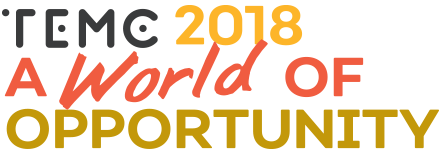
Crown Conference Centre, Perth, Western Australia
Call for Abstracts
Abstract submissions have now closed!
Thank you to all those who submitted an abstract.
The review process has now commenced. Notifications to authors will be sent by Monday, 14 May.
The Preliminary Program is due to be released by Tuesday, 22 May 2018.
Share your experience and your work with a presentation at TEMC 2018 – A World of Opportunity: Shaping the future of Higher Education
Start thinking – what piece of the puzzle are you? What piece you can help with? How can you become innovative?
Our World is one of opportunities: opportunities for innovation, diversity, inclusion, sustainability and technology to be pulled together to help us transform the higher education industry into the future. Each one of us has a piece of the puzzle, and through open forums, collaboration and entrepreneurial thinking we can begin to see solutions shine through.
This conference will explore the future of higher education, and how we can utilize the opportunities presented to us to make this transformation happen.
Information regarding themes available can be viewed here.
Opportunities for presenting
This year’s conference format follows on from 2017 which provides a range of opportunities to present your ideas and learning. As a conference representing a sector intimately involved in learning, the TEMC Organising Committee seeks to support innovation in the delivery of ideas. We encourage you to think of the best way of engaging with your audience, sharing your experience and generating exploration and learning.
In curating the program, the TEMC Program Committee will seek to build a program of linked discussions through the sessions.
Abstract authors may be asked to re frame or further develop their exploration; or explore a collaborative presentation with an author who has submitted a similarly themed abstract.
- HEd talks
- Higher Ed talks (HEd) talks are a 15 minute spoken presentation (including question and answer time)
- Mirroring HEd talks, these presentations are devoted to the spreading of ideas in the form of a short, powerful presentation
- HEd talks are intended to be highly interactive with participants and stimulate discussion
- Whilst the TEMC Program Committee will seek to group HEd talks by sub-themes, we also welcome suggested groupings from colleagues exploring an idea from different perspectives
- Workshops
- A 45 or 90 minute session where workshops presenters will provide participants with the opportunity to develop and learn new skills or where there is a maximum opportunity for dialogue and debate with a small audience
- Workshops may included presentation combined with activities, interactive group or individual work
- Concurrent Sessions
- Concurrent sessions provide an opportunity to explore a topic in depth as sessions are 45 minutes long. This timing should include allowance for interaction with the participants through either question and answer or group discussion.
- We would encourage those electing to use a concurrent session to explore the best way of engaging with your audience.
- Preference for concurrent sessions will be given to abstracts which are submitted by groups, particularly by colleagues across institutions or organisational divisions
- Panel Sessions
- Panel sessions are also 45 minutes in length and may include three to four speakers or more, each of whom talks for a short period of time on a shared theme
- Panels will nominate a facilitator who will build on the individual presentations and work with the panel to dissect their viewpoints and leads a broader conversation with the audience
- Digital Posters
- Capture attention with a short, video presentation which will be played on screens throughout the venue over the course of the conference
- No more than three minutes, digital posters are designed to showcase an innovation, idea or project
- The format can be a simple presentation or animation but should preferably be more than a PowerPoint presentation
- All video presentations submitted, while having sound, will need to be captioned to ensure maximum audience exposure
- Expect that, if selected, your video will play several times over the course of the conference across the venue
- Printed Posters
- Printer Posters are an alternative option to the Digital Posters.
- Posters will remain on display throughout the conference. You will be expected to stand by your poster to discuss the contents with interested delegates for at least one of the scheduled poster sessions. You may want to add your mobile phone number so delegates can arrange to meet you at your poster at specific times.
Successful abstracts will…
- Be no more than 400 words, not including presenter details
- Be interesting, topical and challenging…
- Clearly state the aims of the presentation and how this relates to the sub-theme, or themes, being addressed
- If the presentation is based on a case study from a commercial supplier, only those that have partnered with an educational representative to make the presentation will be considered.
- Answers listed questions relating to
- learning outcomes for those attending
- type of presentation proposed; HEd talk, concurrent session, workshop, etc
- preferred learning environment for your presentation – collaborative space, lecture, workshop or other format
- A personal biography for up to three presenters (a maximum of 50 words per person). This is to include the affiliation of each presenter, including ATEM, TEFMA, University, College, Government Department or Commercial employer
- Be submitted by the closing date.
Tips for presenting an abstract and presenting
It may be an advantage to you to watch a few Ted Talks before public speaking – https://www.ted.com/playlists/226/before_public_speaking
Abstracts close Wednesday, 11 April.

